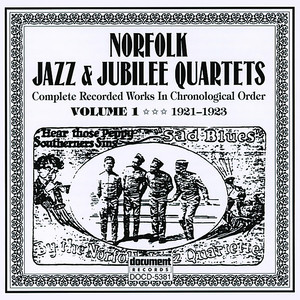
Norfolk Jazz And Jubilee Quartet Vol. 1 (1921-1923)
- 流派:Blues 蓝调
- 语种:英语
- 发行时间:1995-11-21
- 类型:录音室专辑
- 歌曲
- 时长
简介
Shortly after the First World War, an African-American vocal quartet was formed in Norfolk, Virginia by childhood friends Delroy Hollins and Len Williams (baritone and bass, respectively), along with tenors Otto Tuston and James "Buddy" Butts. By 1921, they had begun to make phonograph records, initially as the Norfolk Jazz Quartet and gradually, as they added sacred songs to their primarily secular repertoire, as the Norfolk Jubilee Quartet. When the Document label reissued most of their recordings in six chronologically indexed volumes, the tally came to more than 135 selections, with the sacred titles outnumbering the secular more than two to one. The first volume in Document's unprecedented and still unparalleled Norfolk Jazz & Jubilee Quartet retrospective contains their earliest two-dozen recordings, beginning with 21 sides cut for Okeh at three different sessions in spring, summer, and autumn 1921. Happily, the sound quality is comparatively excellent considering the age of these 78 rpm platters and the state of recording technology at the time. The group's technique is quite impressive from the get-go, with Williams' accentuating bass voice shaping the parameters of every phrase. These are quite simply some of the best of their early recordings, with ragtime and syncopated blues predominating. With very little precedent to go on, the Norfolks sound terrific, especially on "Jelly Roll Blues," "Get Hot," "Wang Wang Blues," and "Strut Miss Lizzie," which was recorded during this same period by Mary Stafford and revisited about 18 years later by Eddie Condon's band. "Standing on the Corner" is recognizable as "Ballin' the Jack," whereas "Big Fat Mamma" was then on its way to becoming a blues standard. This collection is highly recommended as it offers uncommon insights into early jazz singing. About four of the selections are religious in nature, and hint at the direction this group would pursue more thoroughly in the years to come. Initially, however, the Norfolk Jazz Quartet was active in vaudeville. In 1922, they participated in a Mamie Smith revue in Baltimore followed by appearances in Washington D.C. with a musical variety show called The Flat Below under the auspices of F.E. Miller & Aubrey Lyles. Tragedy struck when while visiting Norfolk: on August 19, 1922, Buddy Butts was stabbed to death by his girlfriend in a fit of jealous rage. On the three titles that close this fascinating first volume, the deceased tenor is replaced by Norman "Crip" Harris. The Paramount recording session which took place in April 1923 yielded what amounts to the group's theme song, a syncopated blues sung with slow deliberation and topped with a proud reference to "The Norfolk Jazz."







